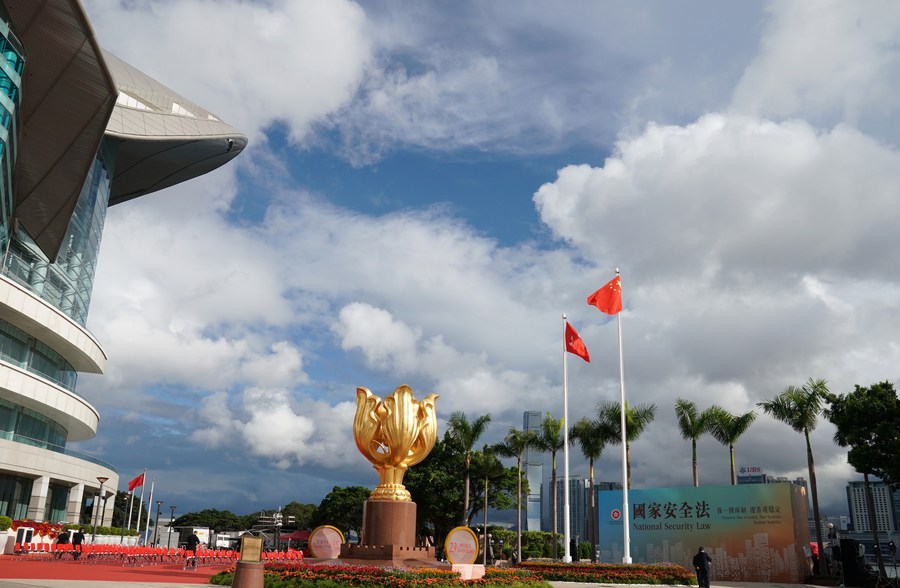Decision serves best interest of HK society
By Yang Sheng | China Daily Global | Updated: 2020-08-24 10:34

The decision of the Standing Committee of the National People's Congress to let the Sixth Legislative Council of the Hong Kong Special Administrative Region continue to discharge its duties for no less than a year after its term expires next month has provided a constitutional and legal solution to the gap caused by the postponement of the Seventh Legislative Council election.
This should allow the SAR government to focus on containing the COVID-19 pandemic. After receiving a formal request from Chief Executive Carrie Lam Cheng Yuet-ngor and the Executive Council of the HKSAR, the central government made extensive consultations with various sectors of Hong Kong society before making the decision and presenting it to the NPCSC for approval.
Zhang Xiaoming, deputy director of the Hong Kong and Macao Affairs Office of the State Council, and Luo Huining, director of the Liaison Office of the Central People's Government in the HKSAR, met and consulted with representatives of people from all walks of life on the best way to avoid a legislative vacuum.
The decision, approved by the NPCSC, is in the best interest of Hong Kong society as a whole as well as in accordance with the Constitution of the People's Republic of China and the Basic Law of the HKSAR.
Some members of the public had demanded the exclusion of opposition lawmakers who had been disqualified as candidates in the Seventh Legislative Council election from serving another year in office after their term expires.
The central authorities weighed their opinions against others' before deciding to keep all the 70 members of the sixth-term council. The decision dispels any conspiracy theory about "ulterior motives "behind the postponement of the election.
The purpose of the decision was to prevent a legislative lacuna that would hamper efforts to win the battle against COVID-19, which is crucial for Hong Kong to revive its economy.
Article 69 of the Basic Law stipulates that the term of office of lawmakers shall be four years. That means postponing the council election till September next year will create a legislative vacuum, and the HKSAR government cannot resolve the issue because it is a constitutional matter that only the NPCSC has the authority to pursue.
What the HKSAR government did is make a formal request to the State Council, China's Cabinet, according to the Basic Law as well as the Constitution. The resulting NPCSC decision is, therefore, beyond challenge by any person or party in Hong Kong.
Article 69 of the Basic Law, which stipulates that the term of office of the council members shall be four years, is an institutional arrangement under normal circumstances.
The decision approved by the NPCSC, however, is a special arrangement aimed at preventing a legislative gap caused by the postponement of the Seventh Legislative Council election until September next year.
It does not replace Article 69 of the Basic Law and, therefore, must not be perceived as such. That is why the decision approved by the NPCSC also maintains that the term in office of the seventh-term council members shall be four years as stipulated in Article 69 of the Basic Law.
The fact that the decision applies to all members of the sixth-term council, including those who have been disqualified in the postponed seventh-term council election, also shows that central authorities are willing to give those opposition politicians another chance to serve the best interests of Hong Kong society.
It is also meant to prevent possible disruptions of anti-pandemic efforts by the opposition camp demanding immediate by-elections for the vacated seats. It is yet more proof that the central government is focused on helping Hong Kong win the fight against the pandemic.
Zhang, the HKMAO's deputy director, mentioned earlier that the "one country, two systems" principle is the crystallization of open-mindedness and inclusiveness of the Communist Party of China in fundamental policymaking.
It has allowed Hong Kong to retain its capitalist system after China resumed sovereign rule over the city, while the Chinese mainland exercises socialism with Chinese characteristics.
That means the opposition camp is allowed to pursue its political agenda only if it abides by the "one country, two systems" principle.
Zhang, therefore, urged the opposition camp to always stay clear of the bottom line on matters concerning the "one country, two systems" principle-one country is the prerequisite of two systems.
All members of the sixth-term council are required to serve until the seventh-term council is sworn in, because their service is needed to facilitate the fight to contain the pandemic.
This is the top priority of the SAR government, including the council, as well as of Hong Kong society, regardless of social status, ideological preference, political standing or religious belief.
The author is a current affairs commentator based in Hong Kong.
























